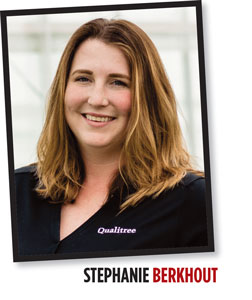1/1/2025
Growers Growing Growers
Stephanie Saccomano

Let’s face it: Horticulture isn’t exactly flooded with fresh faces clamoring to join our ranks. But when someone does show interest, are you genuinely encouraging their growth or are you just in love with the idea of mentoring? Have you invested as much time in growing the next generation of growers as you have in cultivating your plants?
It’s a frequent conversation in the industry and within the large umbrella of “agriculture” as a whole. It comes up when talking with those working in livestock or produce sectors, as well as with us here in the ornamentals world.
Many people in production leadership positions are aging out and often there’s no sturdy succession plan in place. Here in Canada, the average age of people working in agriculture is 56 years (as of the last Ag Census in 2021). If you don’t intentionally pass on your knowledge, it risks disappearing the moment you step out of the greenhouse for the last time. You may not be a person within 10 years of retirement, but moving within your business to other positions—this applies to you, too!
So how do we go about ensuring we’re replaceable? It starts with a deliberate shift into downloading your brain and fostering the next generation.
Welcoming new talent is more than hiring someone and tossing them into the deep end. It’s about creating an environment where they can learn, make a few mistakes, and develop into a capable producer and leader. This takes time, patience, humility and intentionality.
Think about it: Do you actively teach and explain your decisions or do you assume they’ll pick it up as they go? Are you encouraging them to take ownership or are you stepping in too soon because “it’s faster if I just do it”? When they challenge your methods, do you see it as an opportunity to learn and grow together or as a threat to your expertise?
True mentorship isn’t just about passing on knowledge; it’s about creating space for new ideas and perspectives. It’s not always comfortable to think about training someone to do your job. After all, your role is likely a big part of your identity. But succession planning isn’t about pushing yourself out—it’s about ensuring the long-term success of your team, your plants and your business.
Start by documenting everything. Dump out that brain. Create simple guides or videos for recurring tasks. Write down the reasoning behind your biggest decisions. Bonus points if you can show the data that supported these decisions. Share the challenges you’ve faced in the past and how you worked through them. Clarify those growing cycles and key production milestones. But don’t stop at documentation and don’t think a stack of papers or an organized Google Drive folder is the only answer. It’s one thing to write it all down; it’s another to implement processes that allow someone else to take the reins. Delegate responsibilities, teach troubleshooting techniques and slowly hand over decision-making authority. Yes, it’ll be messy at first. Yes, it’ll take time. Yes, there will be difficult conversations. But that’s how growth happens ... for them and for you.
One of the hardest parts of mentoring is stepping back and letting someone else make a decision, especially when you’re certain you’d do it differently. But if you want your successor to thrive, they need to learn how to stand on their own two feet. This means letting them make a call, even if you don’t entirely agree.
It’s tempting to jump in and correct, but ask yourself: Is this decision critical/costly or are we splitting hairs? Will I still get the same crop at the end of the season? Will this choice lead to a catastrophic mistake or is it a learning opportunity? Save your battles for decisions that truly matter or for situations where a decision could truly hurt your bottom line. For everything else, let them experiment, succeed or fail on their own terms.
You’ll find yourself at times relenting on the old-faithful statement of, “Well, that’s just how I’ve always done it.” Together, you’ll suss out new ways to improve. And when they do make a mistake, use it as a teaching moment to help them grow. A good successor isn’t going to agree with you all the time and that’s a good thing. Fresh perspectives often lead to innovation and the friction of differing opinions can push both of you to think more critically. Embrace the scribbly feelings, knowing that being challenged isn’t always easy. It requires humility and an openness to change. It’s worth it, though, because the best successors aren’t just clones of their mentors—they’re individuals who take what you’ve passed on to them and build something even better. GT
Stephanie Saccomano is Head Grower for Qualitree Propagators in Rosedale, British Columbia, Canada.